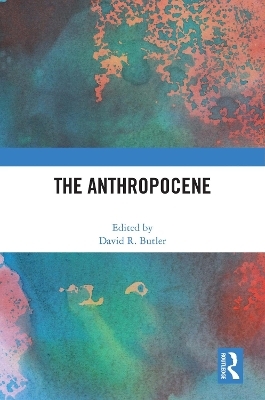
The Anthropocene
Routledge (Verlag)
978-1-032-07669-0 (ISBN)
This book is devoted to the Anthropocene, the period of unprecedented human impacts on Earth’s environmental systems, and illustrates how Geographers envision the concept of the Anthropocene.
This edited volume illustrates that geographers have a diverse perspective on what the Anthropocene is and represents. The chapters also show that geographers do not feel it necessary to identify only one starting point for the temporal onset of the Anthropocene. Several starting points are suggested, and some authors support the concept of a time-transgressive Anthropocene. Chapters in this book are organized into six sections, but many of them transcend easy categorization and could have fit into two or even three different sections. Geographers embrace the concept of the Anthropocene while defining it and studying it in a variety of ways that clearly show the breadth and diversity of the discipline.
This book will be of great value to scholars, researchers, and students interested in geography, environmental humanities, environmental studies, and anthropology.
The chapters in this book were originally published as a special issue of the journal Annals of the American Association of Geographers.
David R. Butler is Texas State University System Regents’ Professor Emeritus, and University Distinguished Professor Emeritus in the Department of Geography, Texas State University. His research interests include geomorphology in the Anthropocene, zoogeomorphology, dendrogeomorphology, and mountain environments and environmental change, especially in the Rocky Mountains.
Introduction: The Anthropocene Part 1: Definitions and Conceptual Considerations 1. The Anthropocene: The One, the Many, and the Topological 2. The Geoethical Semiosis of the Anthropocene: The Peircean Triad for a Reconceptualization of the Relationship between Human Beings and Environment 3. Placing the Anthropos in Anthropocene 4. The Inhumanities 5. Language and Groundwater: Symbolic Gradients of the Anthropocene 6. Agri-Food Systems and the Anthropocene 7. On Decolonizing the Anthropocene: Disobedience via Plural Constitutions Part 2: Historical Perspectives on the Anthropocene 8. Nothing New under the Sun? George Perkins Marsh and Roots of U.S. Physical Geography 9. Synchronizing Earthly Timescales: Ice, Pollen, and the Making of Proto-Anthropocene Knowledge in the North Atlantic Region 10. Geographic Thought and the Anthropocene: What Geographers Have Said and Have to Say Part 3: Physical Geography and the Anthropocene 11. Floodplain and Terrace Legacy Sediment as a Widespread Record of Anthropogenic Geomorphic Change 12. Hotter Drought as a Disturbance at Upper Treeline in the Southern Rocky Mountains 13. Onset of the Paleoanthropocene in the Lower Great Lakes Region of North America: An Archaeological and Paleoecological Synthesis 14. Identifying a Pre-Columbian Anthropocene in California 15. Wetland Farming and the Early Anthropocene: Globally Upscaling from the Maya Lowlands with LiDAR and Multiproxy Verification 16. Putting the Anthropocene into Practice: Methodological Implications Part 4: Natural Hazards, Disasters, and the Anthropocene 17. The Changing Nature of Hazard and Disaster Risk in the Anthropocene 18. Seismic Shifts: Recentering Geology and Politics in the Anthropocene 19. Understanding Urban Flood Resilience in the Anthropocene: A Social–Ecological–Technological Systems (SETS) Learning Framework Part 5: The Environment and Environmental Degradation 20. Reframing Pre-European Amazonia through an Anthropocene Lens 21. Forests in the Anthropocene 22. Abandoning Holocene Dreams: Proactive Biodiversity Conservation in a Changing World 23. Re-envisioning the Toxic Sublime: National Park Wilderness Landscapes at the Anthropocene 24. Climate Necropolitics: Ecological Civilization and the Distributive Geographies of Extractive Violence in the Anthropocene 25. Cultures and Concepts of Ice: Listening for Other Narratives in the Anthropocene 26. Ruins of the Anthropocene: The Aesthetics of Arctic Climate Change 27. The New (Ab)Normal: Outliers, Everyday Exceptionality, and the Politics of Data Management in the Anthropocene Part 6: The Anthropocene and Geographic Education 28. What Does That Have to Do with Geology? The Anthropocene in School Geographies around the World 29. Geographic Education in the Anthropocene: Cultivating Citizens at the Neoliberal University
| Erscheinungsdatum | 31.01.2024 |
|---|---|
| Verlagsort | London |
| Sprache | englisch |
| Maße | 210 x 280 mm |
| Gewicht | 1220 g |
| Themenwelt | Geisteswissenschaften ► Geschichte ► Teilgebiete der Geschichte |
| Naturwissenschaften ► Geowissenschaften ► Geografie / Kartografie | |
| Naturwissenschaften ► Geowissenschaften ► Geologie | |
| ISBN-10 | 1-032-07669-0 / 1032076690 |
| ISBN-13 | 978-1-032-07669-0 / 9781032076690 |
| Zustand | Neuware |
| Haben Sie eine Frage zum Produkt? |
aus dem Bereich


